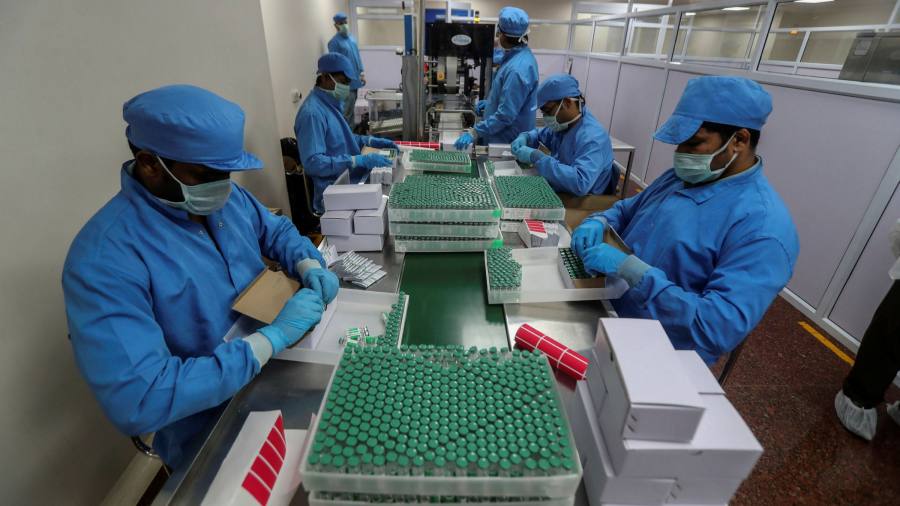[ad_1]
For decades, the Serum Institute of India has been the inconspicuous supplier of vaccines for most of the developing world’s babies.
But the company has been thrust to the forefront of India’s coronavirus diplomacy push with the goal of eclipsing regional rival China’s efforts to inoculate the world.
New Delhi gave millions of Oxford/AstraZeneca doses made by the Serum Institute to six neighbouring countries this month in one of the world’s most expansive vaccine diplomacy efforts.
Despite only starting its own vaccination drive on January 16, India is determined to utilise its vast manufacturing capacity to demonstrate its scientific might and bolster bilateral ties. Its outreach effort has also coincided with questions over the efficacy of China’s Sinovac vaccine, which have dented confidence in the jab.
“In reality, India has been supplying 70 per cent of the world [with vaccines], particularly for the UN,†said Suresh Jadhav, executive director at the Serum Institute of India. “Looking at the queries from countries, I don’t see that position changing.â€
Chinese companies have made an aggressive international push to sell their Covid-19 vaccines, with two leading manufacturers Sinopharm and Sinovac Biotech signing deals with more than a dozen countries.
The race to vaccinate comes as tensions between New Delhi and Beijing are running high after a violent border clash in June. The border stand-off has put the relationship between the countries under “exceptional stress,†India’s foreign minister S Jaishankar said on Thursday.
India’s pharmaceutical companies have rapidly ramped up capacity as they have fielded calls from countries around the world seeking cheap vaccines. To meet demand, the Serum Institute is expanding its capacity to 2.5bn doses per year, with approximately 1bn earmarked for coronavirus.
Narendra Modi’s government has donated millions of doses to neighbouring countries including Bangladesh, which initially had an agreement with China before opting to sign a deal with the Serum Institute. New Delhi said that future commercial deals were likely to be with countries including Saudi Arabia, South Africa and Canada.
“India has the capability and is putting it to good use as a way of building trust,†said C Raja Mohan, South Asia professor at the National University of Singapore. “This is a demonstration of soft power.â€


On the immaculately landscaped Serum Institute campus in Pune, three hours inland from Mumbai, hedges trimmed into the shape of galloping horses hinted at the company’s equestrian past.
In 1946, the late Soli Poonawalla started Poonawalla Stud Farms and became a prominent horse breeder before moving into pharmaceuticals.
His son Cyrus, the company’s chairman and managing director, founded the Serum Institute in 1966. He has since grown his personal net worth to $11.5bn, according to Forbes.
Adar, his son and chief executive, helped expand the privately held business to 140 countries, which accounts for the bulk of its $850m in annual revenue.
The Serum Institute has signed deals to produce 1bn doses of the Oxford/AstraZeneca vaccine for low- and middle-income countries and 1bn doses of the Novavax vaccine.
Other Indian companies have the capacity to produce hundreds of millions more doses of different jabs, with Hyderabad-based Biological E partnering with Johnson & Johnson and Indian companies Bharat Biotech and Zydus Cadila producing their own candidates.
But the Serum Institute’s ability to sell the vaccine, which retails in India for about $3 a jab, is restricted by its agreement with AstraZeneca, which has the rights to distribute to developed countries.
“There are several governments that have approached us directly,†said Mr Jadhav, adding that he had received requests from countries in Europe, the Middle East and south-east Asia. “But because of the territories and contractual obligation, we will see how best we can assist them.â€
The factory floor at the Serum Institute was humming on a visit to the plant in January as vaccine vials were being filled and capped. Every minute, 500 vials were filled by machines imported from Germany and Italy, supervised by workers wearing white PPE suits.
While India has vast ambitions for its vaccines on the global stage, reception at home has been mixed. Covaxin, the vaccine developed by Bharat Biotech, was approved for emergency use without phase 3 trial data, prompting criticism that the process was rushed.
During the Financial Times’ visit to the Serum Institute, a fire broke out, killing five people at the under-construction Manjri site, which is to be used for the future production of tuberculosis and rotavirus vaccines.
But analysts said the disaster was unlikely to diminish appetite for the company’s vaccines. “Serum Institute is quite well known, it’s already manufacturing and distributing,†said Shrikant Akolkar, a pharmaceuticals analyst at Ashika Stock Broking in Mumbai, though he conceded that the incident was worrying.
Dr Umesh Shaligram, the Serum Institute’s director of research and development, said that India’s record of delivering safe vaccines gave it an edge over rivals. “I don’t foresee any competition from Russia and China.â€
Coronavirus business update

How is coronavirus taking its toll on markets, business, and our everyday lives and workplaces? Stay briefed with our coronavirus newsletter.
[ad_2]
Source link





